-
1752
Native vs. Cross-Platform Apps: Which to to Choose
React is open source web development library while React Native is a mobile app development framework. But these tiny things are not the only difference these two technologies have, there are various other things to know. We will learn everything that differentiate React from React Native in the Reactjs vs React Native comparison.
Are you someone on the verge of building a mobile app but feeling all at sea when selecting whether to develop a native or cross-platform application? If you are, this article is for you! This guide will assist you in making a perfect decision when it comes to Native Vs. Cross-platform development. Explore more!
As per Statista, around 1.64+ million apps are available on Apple’s App store and 3.55+ million apps on Google’s Play Store. These applications target approximately 14 billion mobile users worldwide. Companies leverage this opportunity to widen their reach to many customers and grow their businesses.
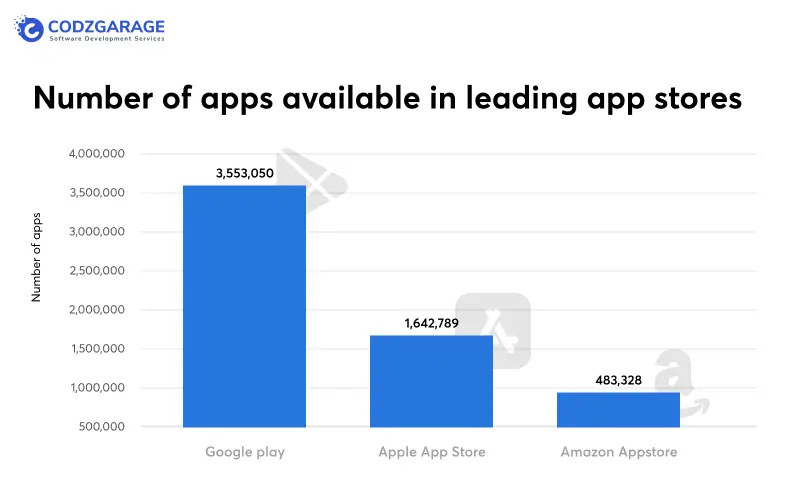
Undoubtedly, a mobile app is an excellent way to assist you in growing your business to distinguish between Native Vs. Cross-Platform App Development might be an arduous task to perform for many. It is a common trend to compare technologies like React Native vs Swift to know if hybrid or native technology is suitable for them. Hence, this article involves everything you need to troubleshoot the issue. Let’s look up and down!
Codzgarage is the most reputed custom software development company offering native and cross platform app development services to clients worldwide. Connect with us for FREE consultancy or build a native or hybrid application.
What’s a Native App?
Native app development refers to creating applications exclusively for a particular platform, for example, iOS and Android. The application gets developed using a programming language specific to a single platform. For instance, you can build a native Android app using Java or Kotlin and an iOS using Objective-C and Swift.
Native Applications are high-performance apps renowned for delivering exceptional user experience—as the visuals are tailored to the platform UX.
However, native app development concurrently for each platform leads to higher expenses and efforts that might keep businesses from creating a native application.
Pros and Cons of Native App
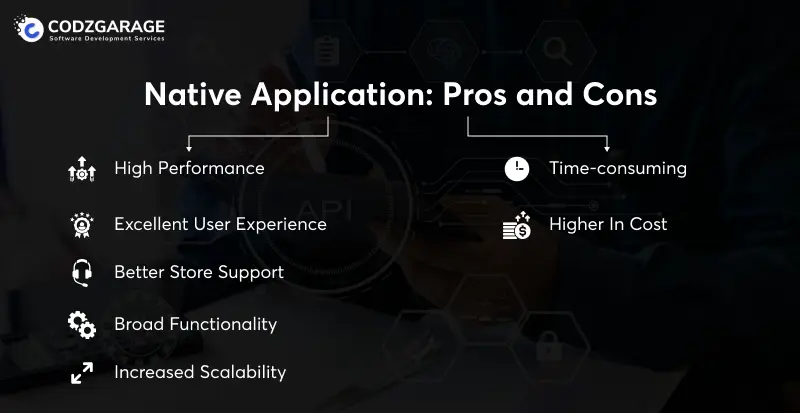
Native applications are crucial and in demand among enterprises. They are costly upfront, but save huge in the long run. But, that does mean they are loaded with all goodies. You need to explore from both angles. Let’s explore.
Pros
- High Performance: An uninterrupted direct connection between the underlying resources and code ensures high-end performance.
- Excellent User Experience: Native applications own a better UX for their own platform.
- Better Store Support: A native application delivers preferable performance and speed. Therefore, they are more likely to be convenient when getting published and ranking higher in app stores.
- Broad Functionality: Developers have ample access to the APIs offered by the platform. In general, there’s no restriction on how a programmer can work with a new application.
- Increased Scalability: Thanks to the flexibility in resource management, the tools and applications developed for the native environment are likely to be scalable.
Cons
- Time-Consuming: When building a native app, you can’t utilize the same code for another project resulting in more time consumption during app development.
- Higher In Cost: Building applications separately need two teams for each; hence, it might be expensive for anyone to build native applications.
When To Consider Native App Development
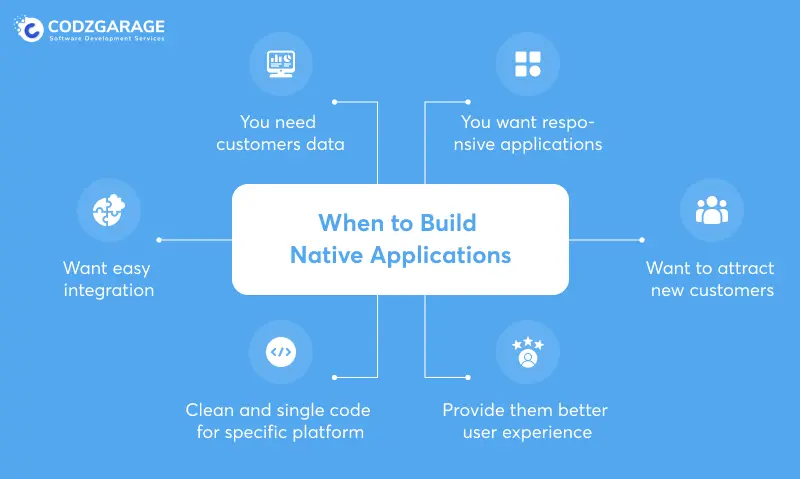
You should consider building a native application when_
- You want an application that can conveniently get integrated and updated with additional features when you need it.
- Your target audiences are going to use your app for the first time, and you want to make a good impression by offering them an excellent user experience.
- You wish to take optimal benefits of the device’s hardware, for instance, cameras, GPS, and so on.
- You want to develop a responsive application.
- You require code specifically for a single platform.
What’s A Cross-Platform Application?
Native and cross-platform applications are different in many ways. Cross-platform development is the process that involves building an application that performs on different platforms. Developers can use tools like Xamarin, Flutter, React Native, and so on to develop a cross-platform app. Applications developed using these programming languages can be deployed on both iOS and Android.
However, cross-platform development curtails the time, effort, and cost associated with it; you might have to bear the lower quality of the product. As you can save time, effort, and expense, you have to sacrifice when integration and making changes to it.
Pros and Cons of Cross Platform Applications
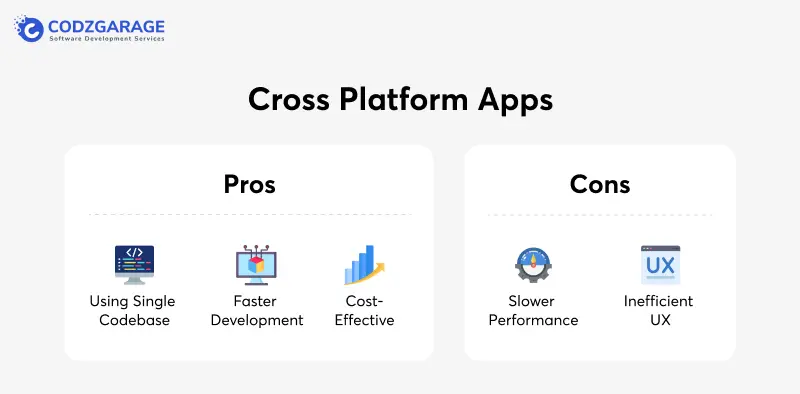
Cross-platform applications are the best bet for those looking for cost-effective applications. With cross platform, you run a single codebase across cross platforms. But, with tons of benefits, there are cons of using cross platform. Let’s explore pros and cons cross platform.
Pros
- Using Single Codebase: The code is created using a single tool and can be utilized for other project development as well.
- Faster Development:Developers need to create a single codebase for the app development resulting in a faster development process.
- Cost-Effective: When building cross-platform applications, you don’t need separate developers to build apps separately, resulting in reduced expenses.
Cons
- Slower Performance:A cross-platform application requires an additional rendering process and abstraction layer, making the app slower in terms of performance.
- Inefficient UX: Cross-platform applications are incapable of taking the benefits of native UX components, resulting in a lack of user experience.
When To Consider Cross-Platform App Development?
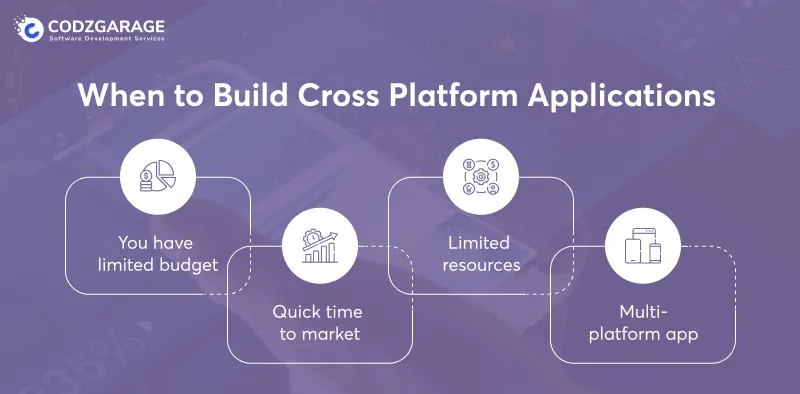
- Consider building a Cross-platform application when_
- You have a limited budget, time, and resources, and you require to deploy a mobile app on different platforms.
- You need to build an application in no time.
- You’re ready to have a less responsive application.
- The app has no complexities and doesn’t require functionalities that differ much between the platforms.
- You want to target both Android and iOS users.
Native Vs. Cross-Platform Application Development: An In-Depth Analysis Following a Critical Approach
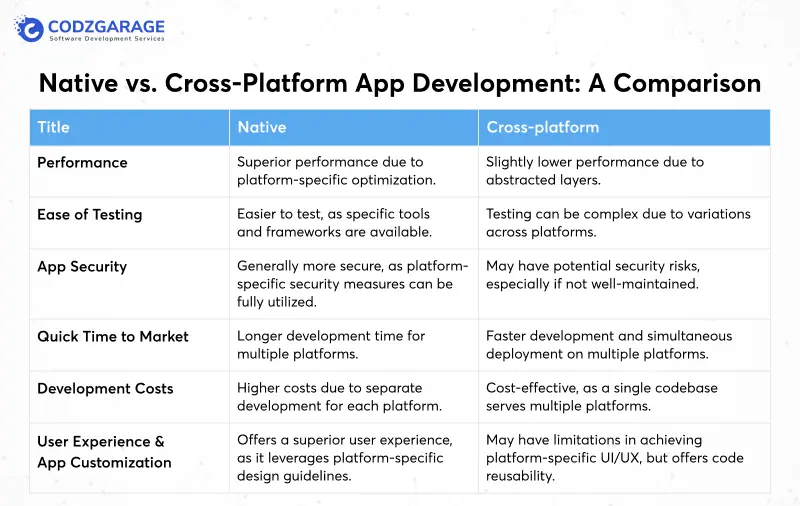
As we have looked at some basics of Native & Cross-Platform Apps Development above, now, let’s explore it in detail. We discussed what Native and cross-platform apps are, their pros and cons, and the time to develop.
Besides that, we explored the circumstances when one needs to create one. Now, let’s move towards an in-depth analysis of some more aspects, like performance, security, cost, customization, and so on.
Performance
Mobile apps have next-level computing requirements, especially for games. Therefore, if you want an application to deliver high-rated performance, you better consider native app development. Creating a cross-platform application may not satisfy your requirements leaving your needs unextinguished. Anyone who wants high-end performance should consider building a native application that functions effectively, fulfilling users’ needs.
Ease Of Testing
Would you tolerate a bug lurking around your application when a user accesses it? Of course, a big no! App testing matters the most to ensure an app has a better user experience; hence it’s essential to test an application before it gets deployed. Testing a native application is tough as they require individual testing for app versions like Android and iOS.
Contrary to this, testing a cross-platform application is convenient because of a single codebase— you need to test a single code that can be reused across platforms.
App Security
In terms of security, first of all, you need to gauge the impact that losing users’ trust would have on your business and then make the decision accordingly. Robust security assurance is of immense importance for particular apps like banking apps. If the risk is high, you prefer building a native mobile application that facilitates several built-in features, like intelligent fraud detection and file encryption, by making use of operating systems libraries.
On the other hand, cross-platform development isn’t a perfect solution if you have security restrictions. It might have security vulnerabilities resulting in not the application you expect for your business.
Time To Market
When it comes to time to market, cross-platform applications win the race. Businesses want to launch the product as early as possible to start receiving feedback from the users. For this, cross-platform apps are the best fit– as they are quick to develop and iterate.
Native applications, on the other hand, are time-consuming and tough to maintain, resulting in a slower time to market. Hence, for a better time to market, cross-platform development should be the best choice.
Development cost
When it comes to cost, cross-platform application development stays ahead of the curve. Native app development is for a particular platform, hence needs a separate team and particular coding that you can’t utilize for another project resulting in an increased expense.
Contrary to that, building cross-platform applications is less in the budget— as the code written for this app can be utilized for another project resulting in a higher reduction in time and cost. Those having a limited budget should consider cross-platform development.
User Experience & App Customization
Around 70% of customers state that they abandon their shopping carts when they find an absence of a better user experience. Approximately 90% of smartphone users agree that they prefer to continue shopping if they get a satisfactory user experience. Customers have plenty of expectations from a brand, and getting a worthwhile user experience through the app is one of them.
This advocates that the overall user retention rate depends on the user experience of an application. Native applications own high-level UI capabilities– as they have customizable interface components and preset libraries. Therefore, organizations in need of quality customization and user experience should consider native application development.
Wrapping Up:
Regardless of the industry vertical you’re dealing in, the mobile application you build has a lot to do with your business and its success. So you must wisely invest in mobile app development and build one that fits your unique business needs and customer expectations. It can bring an insurmountable advantage to your business.
Whether you go for native or cross-platform application development depends on your business needs, its customers, and many other facets. Creating both iOS and Android applications have pros and cons; hence, you need to assess your requirement, hire the best mobile app developers and build one that meets what you expect.
FAQs
Both native and cross-platform app development has advantages and disadvantages, and one that fits another business might not fit your needs. It entirely depends on your requirements and expectation, your user base, and so on. Gauge intensively and go for the app development.
Cross-platform app development is the process of analyzing, designing, developing, testing, deploying, and maintaining applications with a single codebase that can run on different platforms.
There may be several reasons why a native app is always costly compared to a cross-platform application; the bigger one is code reusability. A single codebase is used for all platforms when it comes to cross-platform development. In contrast to this, native app development requires a separate codebase for iOS and Android resulting in an increased expense of application development.
Cross-platform app development requires less maintenance and makes sure a streamlined and hassle-free project development lifecycle compared to native applications development.
Want
Hire Dedicated TeamExpertise Level
- Skilled team
- Collaborative
- Committed



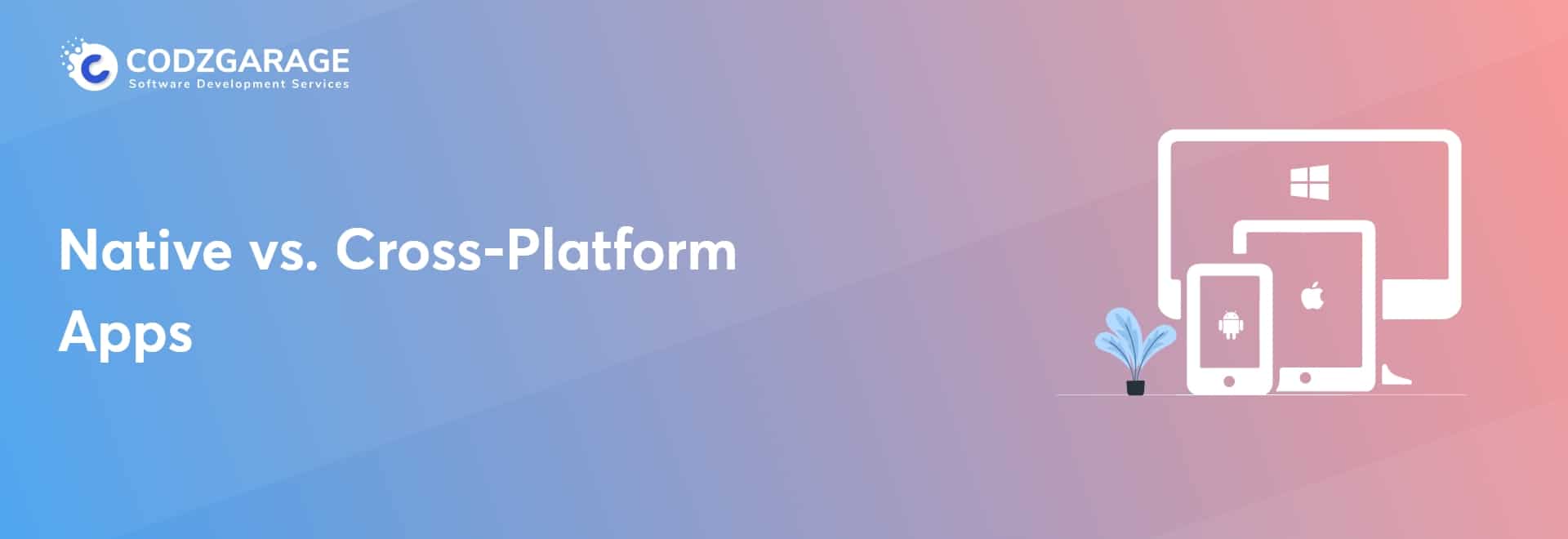


 Paresh Kapuriya
Paresh Kapuriya 







